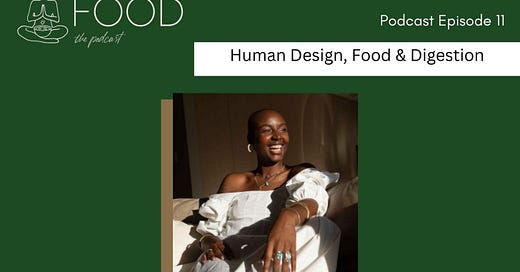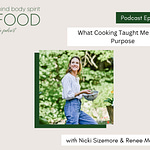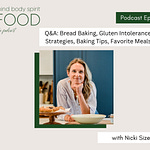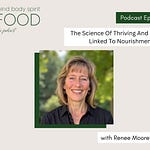Hello, and welcome to the podcast! Today’s episode is so expansive. I speak with
a spiritual philosopher & the founder of . Jas is a practitioner of Human Design, Astrology & the Gene Keys, and she supports creatives, entrepreneurs and renaissance humans in understanding themselves more holistically. She is also the host of the globally celebrated podcast, Counter Culture.In today’s episode Jas and I explore human design and how it relates to food and digestion. Jas explains that human design is the study of our unique selves. She believes that through understanding how our bodies and minds best function, we can gain more authority and sovereignty over our lives.
Jas discusses the determination/digestion variable in human design, which refers to the ways in which we best take in, process and absorb not only food, but also information and energy. She explains how when we feed ourselves—physically, emotionally and spiritually—in a way that best supports our design, we can better access our full potential.
Each person has a specific determination. I mention in the show that I’m a “Light” eater, which is 6th determination (this doesn’t have anything to do with how much I eat, but rather how digestion is influenced by the time of day). I’m an “indirect light” eater, which was fascinating for me to learn, since, as I describe in this newsletter, I sleep best with some food in my system (regardless of what people have told me about eating before bed!). Below you’ll find a description of all the variables. Remember, these are invitations to explore our own specific systems—they are not meant to be protocols or dogmas, but rather mirrors into how we can best function.
Human Design Determination/Digestion Variables
1. Appetite: Works best with simple foods that are wholesome and nutritious.
Consecutive: Too many ingredients too fast can overwhelm the system; eating (or digesting) one thing at a time (nice big meals) supports the system.
Alternate: Simple ingredients & doesn’t need to eat as often, but at a frequency that feels best.
2. Taste: Sensitive palate preferences and selective systems.
Open: Very selective, with specific likes. Thrives on repetition and eating with the seasons.
Closed: Also very selective, and likes to stick with the same foods over and over. Will switch seasonally. Sensitive systems that don’t need to experiment with new foods all the time.
3. Thirst: Digestion is strongly correlated to temperature and hydration.
Hot: The body doesn’t produce enough internal heat, so has a harder time digesting cold foods. Eating warmer foods, and staying well hydrated, best supports the body.
Cold: The body produces a lot of heat (might sweat a lot), and cold or raw foods are very supportive. Also, stay well hydrated.
4. Touch: Can handle a lot of different types of foods but is sensitive to the energy around them with nourishing themselves.
Calm: Is easily overloaded with information and digests best in a calm environment (in a quiet space or perhaps alone).
Nervous: Best digests food and information in high-energy, stimulating spaces or on the move.
5. Sound: Digestion is influenced by the volume of sound and the volume of information.
High: Assimilates food best in acoustically pleasing situations with other people or with harmonious sounds.
Low: Very sensitive to acoustics and digests best in quiet spaces, perhaps alone.
6: Light: Highly sensitive to the time of day when digesting.
Direct: Sensitive to light and processes food and information best during the day. Doesn’t sleep well with food in the system.
Indirect: Processes food and information best in the dark, and may sleep better with food in the system.
Sample Human Design Chart
Here’s what a human design chart looks like (the sample I found happened to be for Taylor Swift 😂).
Jas goes further to say that if we ignore the signals of the body, or perhaps don’t feed ourselves in a way that best suits our design, then things can manifest as illness. She shares her own personal experience with eczema, and how she was able to heal only after getting to the emotional root of the symptoms.
This conversation is so expanding, whether you’re familiar with human design or not. You’ll leave with a new perspective on how we are all so unique, and how we can gain more authority over our lives by better understanding (and honoring) our unique selves.
You can listen to the podcast right here, or, better yet, subscribe to the podcast in Apple Podcasts, Spotify, or Stitcher. Please drop me a comment if you give it a listen, and if it resonates with you, share it with your people or rate it in your podcast app—it goes a long way in supporting this work.
xo, Nicki | @nickisizemore | more recipes | cookbooks | classes
Links
Find Jas on Instagram: @erahsociety , @jasnnenna
Erah Society Newsletter: Erah Society
Discover your own human design with a Soul Map: https://erahsociety.com/soulmap
German New Medicine: https://learninggnm.com/
Counter Culture podcast: https://www.jasmoon.space/podcast
Vaness Henry (Human Design): @vanesshenry
















Share this post